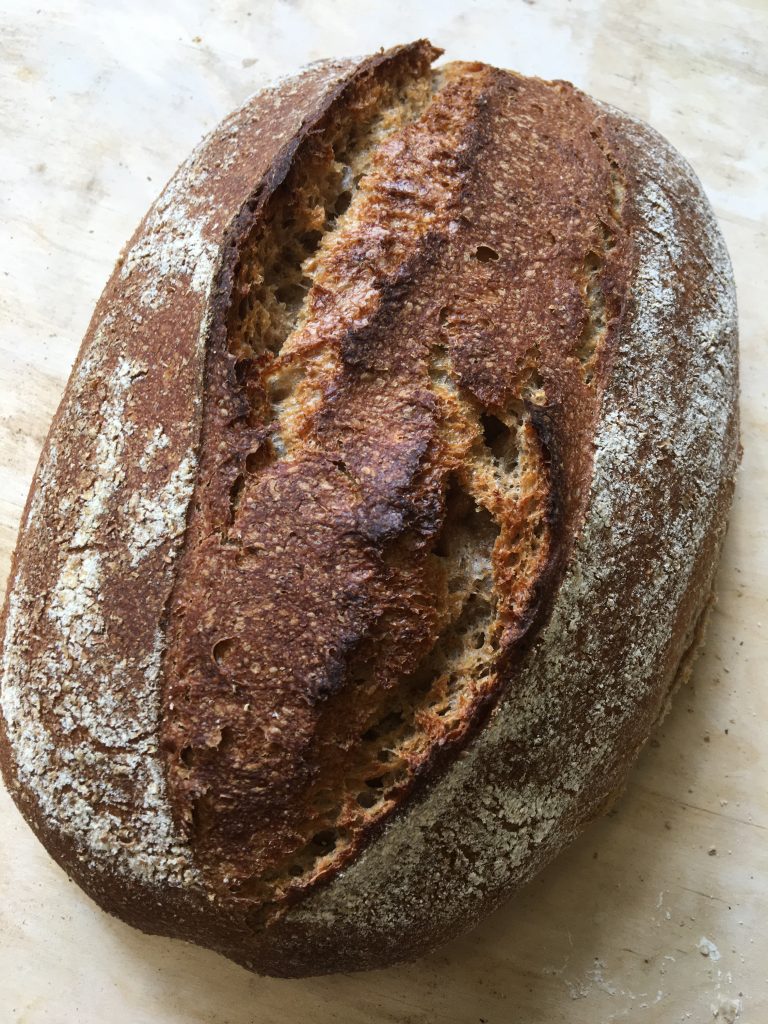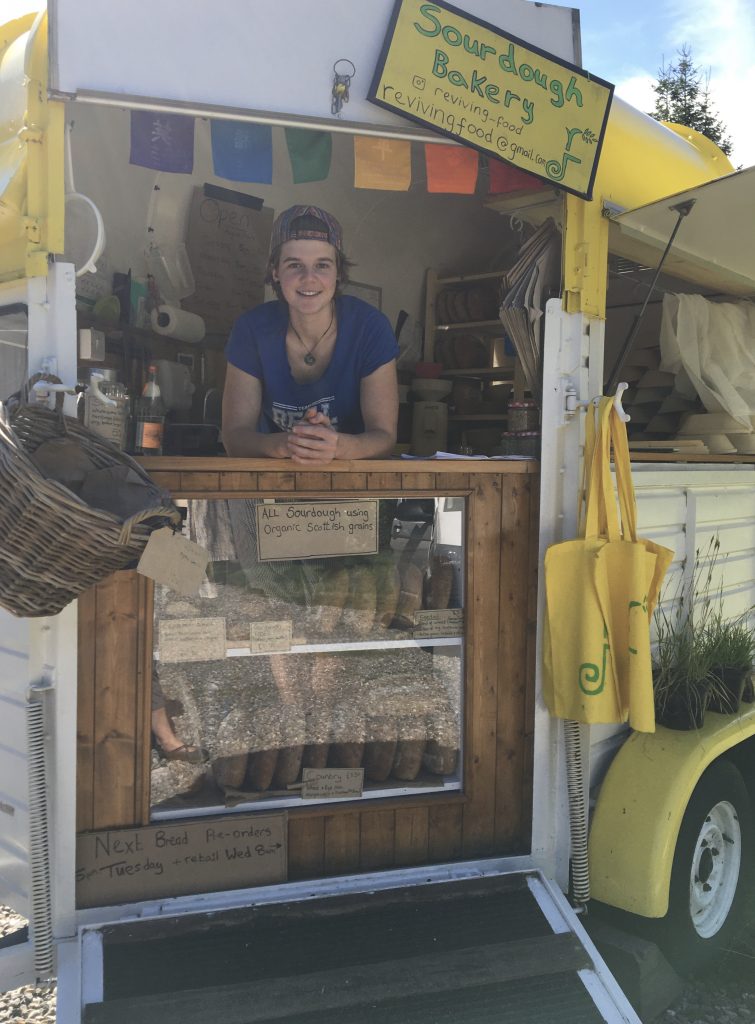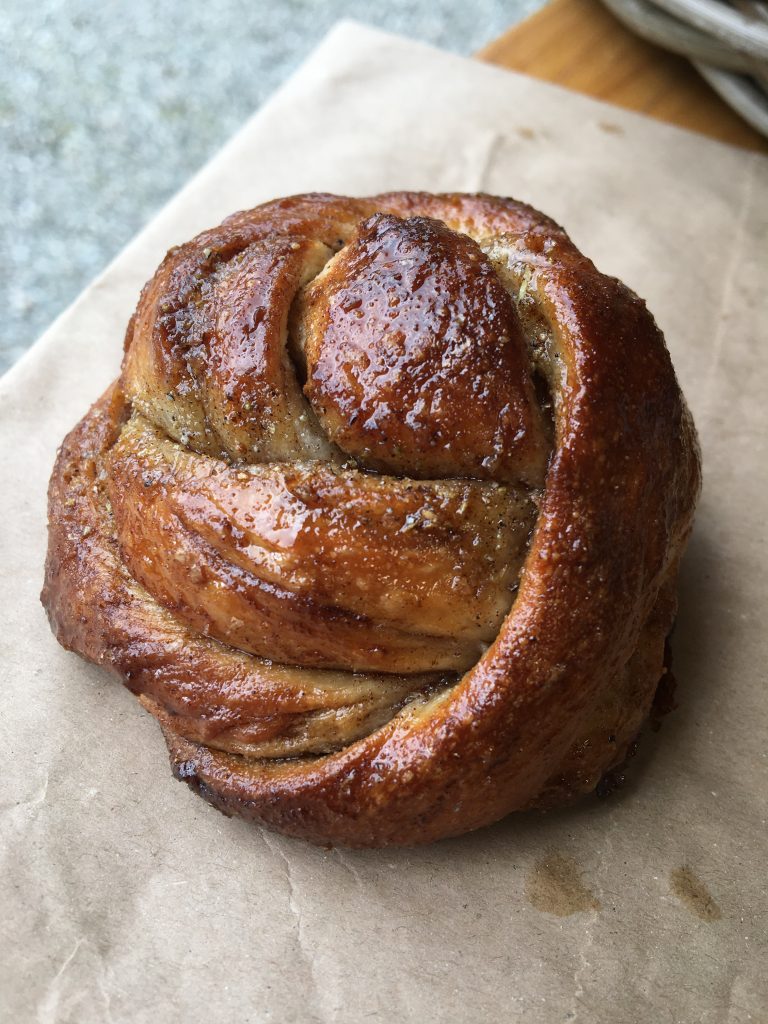In the Highlands of Scotland, not far from the mountain resort town of Aviemore, there is a bright yellow horsebox, decorated with colourful flags. That horsebox is the home of Reviving Food, a mobile micro-bakery, where founder and owner Rosie Gray bakes and sells sourdough bread and pastries to feed the small, rural community of Kincraig. But it isn’t just a bakery—it’s also a place for the community to come together to have important conversations about the big and the small; it’s a site of reconnection, a place where those who eat Rosie’s bread can get to know the farmers and millers and, of course, the baker, who have worked hard to make make their loaves possible.
In 2019, Rosie reached a turning point in her life. After years of all kinds of seasonal work, training at Ballymaloe Cookery School, and working in bakeries from Comrie to Belgium, she decided it was time to start her own bakery.
“That was when I really decided, ‘I want to do my own thing,’” she said. She wanted to be in charge of what kind of bread she got to make, wanted to get to know the people growing and milling the grain, and, crucially, she wanted to have a place where she could speak with her customers and share stories with them. As the old adage goes, the way to peoples’ hearts is through their stomachs, and Rosie takes this approach seriously. By feeding them with good food, she hopes to get “folks interested and curious about what they’re eating and where it’s coming from.”
At Reviving Food, featured on Farmerama Radio’s new series Who Feeds Us?, customers are drawn in by the “quirky” yellow horsebox. But Rosie said they often stay to chat about “whatever I’ve been thinking about, fermenting ideas in my head all day.” She invites them to watch her work as she loads bread into the oven, gently encouraging them to develop a closer connection to the land and the hands that feed them. As Rosie puts it, this is about activism through action.
“I’ve met folk that introduce themselves as activists, and I think maybe some activism is angry,” she said. “And that’s one way of dealing with things, and having protests. But I think another way is actually by engaging with people differently, and that’s this thing about working with telling stories and curiosity. … if it can get people to question a bit more, questioning their choices, to me that’s a different form of activism.”
For Rosie, this means baking bread she believes in, in a way that reduces the impact of peoples’ diets on the environment, and talking to her customers about it. In her garden, next to the bakery, Rosie is growing a small plot of wheat she was given by Rupert Dunn, peasant baker and founder of Torth y Tir bakery in Pembrokeshire. She hopes that although “it’s looking a bit shoddy,” the wheat, too, will spark curiosity in her customers. She’s also working on a display on the wall of the bakery of the faces of all the people—the farmers and the millers—involved in making her bread on the wall.
“You see me here,” she said, “and you see my bread, but there’s all of this that’s still faceless within it. I want those characters as they are right now. … Exactly as the people are. Real folk and real food.”
The conversations Rosie has had since she started Reviving Food in early 2020 haven’t just been about the food system: they’ve been about peoples’ everyday lives. Over the summer, while social distancing measures were in full force, the bakery became a real hub for the community, where local Kincraig residents could gather in the fresh air (at a safe distance from each other), pastries in hand. Rosie realised that she had stumbled into a focal position in terms of facilitating community connections. As she realised this, she became more aware of the responsibility she has towards the health—both mental and physical—of her customers.
“It turned into like a sociable thing… because you realise they’ve not spoken to anyone else except their family, and they’re not getting out of the house,” she said. She emphasised how important it was for people to be able to catch up with each other—whether it be light-hearted gossip, noticing the different birds that had emerged during the lull of lock-down, or more solemn matters, like expressing condolences to those who had lost people during or as a result of the pandemic.
As restrictions have eased somewhat, and since Scottish schools started back at the end of August, Rosie has had an even more diverse range of people stopping by for bread and a chat—parents after the school run, builders on their way to work, European tourists, middle-aged cyclists.
“You get a right good chat,” she said, “[about] what kind of bread they like and what their opinions are on different things.”
During the lock-down and the socially distant period afterwards, Rosie struggled with living and working alone. Although she had an online network of support that she was able to lean on, “my top fear was loneliness,” she said. “It was really hard for me. … Because when you start to feel lonely, then…it just spirals and everything else starts to fall apart. And Coronavirus forced that on me.” Coming out the other side, though, she appreciates the social elements of her work all the more. Although, originally, she chose to establish the bakery in a horsebox because she didn’t want to be tied to a single place, she now feels very happy to be settled in the community.
“It’s just really amazing, now, to get to know all these different characters and what they’re doing. And I’ve got folk come by to get bread and they’re like ‘Oh, do you know a joiner?’ and I’m like, ‘Yeah, Jack’s a joiner!’… I have all these characters that come into my life. … and as their stories carry on and their families come to visit and, yeah, just being part of that, that’s what’s really lovely.”
About the author
Olivia Oldham is a freelance journalist, copywriter, editor and aspiring novelist. She works for Farmerama, an award-winning podcast sharing the voices behind regenerative farming, and is responsible for storytelling at Farms to Feed Us. This blog is part of Farmerama’s latest project, Who Feeds Us?
Who Feeds Us? is a chorus from the people who have fed us throughout the Covid crisis: people from all over the UK, of many different ages and beliefs, from different backgrounds, regions and classes; farmers, growers, community leaders, healers, chefs, beekeepers, and fishers. Who Feeds Us? is an important series about the relevance of food sovereignty to everyone in society. This means putting our food back in the hands of the people, and prioritising nature and nourishment. Tune into Who Feeds Us? via all major podcast platforms or on Farmerama Radio’s website.


